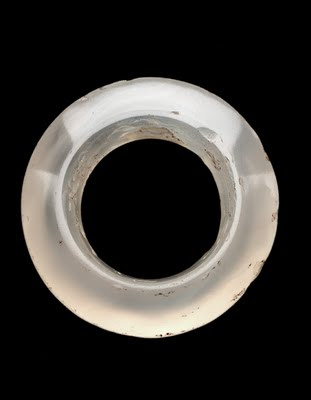Mishima Yukio came into my life relatively late, when I was around eighteen. The first book I read was his
Forbidden Colours 禁色. I remember how enchanted I was, and how absorbed by the story I was that there was a certain sadness when I was approaching the end of the book, as if I did not want to leave that magical realm just yet. After reading his
Golden Pavilion Temple, I would say that my thoughts, views of this world and aesthetics were much defined, perhaps they even found an identity. In a way, I felt a sense of belonging in the intense, exquisite and intricate flashes of poetry in his articulate and abstract writing. Yet how his language and narratives flow. My favourite work of Mishima, and one that influenced me the most, is his final novels - the tetralogy
The Sea of Fertility (豐饒之海), composed of
Spring Snow (春雪),
Runaway Horses (奔馬),
The Temple of Dawn (曉寺), and
The Decay of the Celestial, or
The Decay of the Angel (天人五衰). Although in my opinion these four books are best read in sequence, my personal favourite ones are
The Temple of Dawn and
The Decay of the Angel. I was deeply moved ("rocked" could be a better word!) by this tetralogy the first time I read it that I wrote poems after each novel, and dedicated to Mishima Yukio, to whom I feel that I am indebted to - for his artistic achievement, aesthetics, thought system, and his love. These poems were all written in 1999.
“If, raised by the power of mind, a man relinquishes the common way of looking at things, gives up tracing… their relations to each other, the final goal of which is always a relation to his own will; if he thus ceases to consider the where, the when, the why, and the whither of things, and looks simply and solely at the what; if further, he does not allow abstract thought, the concepts of the reason, to take possession of his consciousness, but, instead of all this, gives the whole power of his mind to perception, … so that it is as if the object alone were there, without any one to perceive it, and he can no longer separate the perceiver from the perception, but both have become one … if thus the object has to such an extent passed out of all relation to something outside it, and the subject out of all relation to the will, then that which is so known … is the Idea, … he who is sunk in this perception is … pure, will-less, painless, timeless subject of knowledge.”
~ Schopenhauer, The World as Will and Representation, Vol. I., Third Book, p. 231, in the English version trans. by R. B. Haldane and J. Kemp (London, three vols, 1909).
天人五衰,意指天人壽命將盡時,所出現的種種異象。五衰又有大五衰、小五衰兩種。
死亡美學(獻詩三島之金閣)
戰後的廢墟,重建
赭色小提琴喤泣聲線
金箔剝蝕的蒸氣與躁動的香
月華清明塗抹石橋
一如滌淨生的 死亡的確知
我兀自佇立文字的金閣
美學修長的眼睫投影
蔭翳,光正自盡。
顫抖顫抖再顫抖,這齣劇本
與血的斑痕纏綿似水
海面痛苦地沉默
光,一如岩礫,一如陰影,光的自縊。
自縊的美學倫理糾結糾結死的似非而,是。
仁波切寂然誦經
呢喃破曉前刻精神與美的歸巢
逐步逐步,緊貼眼睫的哀悽
生的諷刺文體的,死
的潔白墓塚
光正瀉落一湖的私密,若水。
春雪
透過冰寒的指尖傳遞的水晶;
殘雪流麗時節
逝去透明的傷口..
你唇際每一朵薔薇的綻放,便墜落一整季冬夜的星空
鋼琴碎在半透明的睫毛中
之後
音符便似瞳孔灼燙的匕首
奔馬
夢先於現實。
而純粹
似花,似血,似詩
,似枯腐前消逝的生。
曉寺
(薰息,我執,唯識)
緣起於鏡花水月的無常
存活涅槃之花瓣間的阿賴耶識,似
剔透的純藍火焰蘊蓄
鏤花之詩
桃花心木質的鏤空雕花
在蒼白哀傷的殘月撫觸下
散發似水晶斷面般清明露華
濕漉而冷冽的香氛
豐饒之海之天人五衰(獻詩三島由紀夫)
他的世界構築於
對純粹牲祭的行動性
似花之骨髓般的血
他傾洩一身的孤注一擲
於苦痛而豐饒
的虛無之海
如若阿賴耶識是月華的羽翼
飛翔於極度神聖與極度污穢的貝那雷斯
是否沉痛如我執與薰息的唯識色界
得以釋放自殘雪的純粹?
他精神性的美學體系
他對生命、神聖與純粹的無窮需索與追尋
無聲地崩毀於佛陀澄明而冷冽如水的眸子
美麗虛幻而無常若花的微笑
他的生命無聲地崩解於
月之海中虛弱而豐饒的涅槃
而他磅跎的精神體系,與
凝鍊先驗的詩性呢?
恰似無法埋藏於大海中夕陽的掙扎
恰似大自然神聖而無以名狀
的悲苦與愛
而當他的精神現象美學崩毀
當我得以窺視他文字與思想的金閣
當我得以體悟他
不可思議的美與愛
我竟躊躇畏懼掇拾自美的廢墟中
破碎猶濕熱的骨肉
我竟畏懼於參與他壯闊豐饒而苦痛的
精神美之海洋中的呼息
與之共振,並互融為殘春之雪與月
因深恐破碎他幾近完美的神性,驚擾他
悲傷而純粹冷冽的愛
而何處得尋他無我的流動?
何處得覓他阿賴耶識的種子?

































